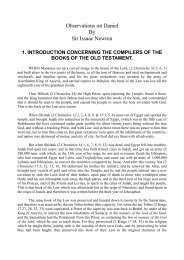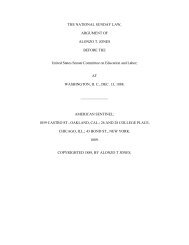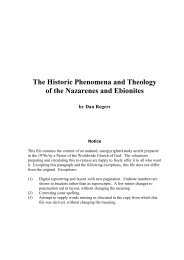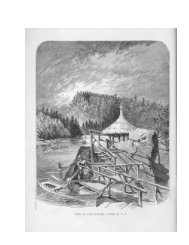by Percy E. Corbett - friendsofsabbath.org
by Percy E. Corbett - friendsofsabbath.org
by Percy E. Corbett - friendsofsabbath.org
You also want an ePaper? Increase the reach of your titles
YUMPU automatically turns print PDFs into web optimized ePapers that Google loves.
7<br />
The Sanctuary at Glastonbury retained its importance as a place of refuge into medieval times<br />
despite the changes in religious practices. One of those who fled there, according to William of<br />
Malmesbury, was the second Patrick, who was known as the Abbot of Ireland.<br />
Before continuing with important events associated with Glastonbury, it seems - appropriate to<br />
record some details of the practices of the Druids.<br />
According to Dudley Wright in "Druidism, the Ancient Faith of Britain," the Druidical Order in<br />
Britain is said to have numbered thirty-one seats of education, each being a cyfiath or city, the<br />
capital of a tribe.<br />
Repentance and purification were regarded <strong>by</strong> the Druids as necessary duties. They observed<br />
one day in seven as peculiarly sanctified and made holy <strong>by</strong> the great Creator and they were<br />
wont to dedicate one-tenth of all their substances to religious purposes.<br />
The period of novitiate and the character of the training of an aspirant to the Druidical<br />
priesthood lasted for twenty years. Four degrees were conferred during the long novitiate, the<br />
first being given after three years study In the arts of poetry and music if the candidate, <strong>by</strong> his<br />
capacity and diligence, merited the honour. The second was conferred after six years further<br />
study, if merited; the third after a further nine years study; and the final degree, equal to a<br />
doctorate, was bestowed two years later on the completion of the twenty years course.<br />
The first requisite for admission as a disciple was unimpeachable moral character, for it was<br />
indispensably necessary that the candidate, above all things, should be above any criticism as<br />
to character and conduct.<br />
Nine years was generally sufficient for graduation as a Bard, but his education was not<br />
considered complete for the purpose of this graduation until he had committed to memory<br />
twenty thousand verses containing in allegorical language the tenets of the Druidical faith.<br />
About the 5th century, B.C. the 16th King of Britain, Dunvallo Molmutius, introduced<br />
laws which were later translated into Latin and were famous in Britain until the time of<br />
William the Conqueror. He made Winton (Winchester) his capital. London was only second in<br />
importance according to an Anglo-Saxon map of the world preserved in Hereford Cathedral.<br />
Selection from his laws are:-<br />
"There are three tests of Civil Liberty:- equality of rights, equality of taxation and freedom to<br />
come and go."<br />
"There are three civil birthrights of every Briton; the right to go wherever he pleases, the right<br />
wherever he is to protection for his land and sovereign, and the right of equal privileges and<br />
equal restrictions."<br />
"There are three sacred things <strong>by</strong> which the conscience binds itself to truth; the name of God,<br />
the rod of him who offers up prayers to God and the joined right hand."<br />
"There are three persons who have the right to public maintenance; the old, the babe and the<br />
foreigner who cannot speak the British tongue."

















